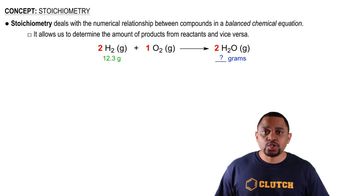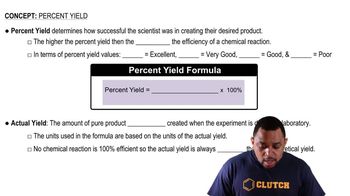Here are the essential concepts you must grasp in order to answer the question correctly.
Stoichiometry
Stoichiometry is the calculation of reactants and products in chemical reactions based on the balanced chemical equation. It involves using mole ratios derived from the coefficients of the balanced equation to determine how much of each substance is consumed or produced. In this case, understanding the stoichiometric relationships between acetic acid, isopentyl alcohol, and isopentyl acetate is essential for calculating the theoretical yield.
Recommended video:
Molar Mass
Molar mass is the mass of one mole of a substance, typically expressed in grams per mole (g/mol). It is crucial for converting between grams and moles, allowing for the determination of how many moles of reactants are present in a given mass. In this problem, calculating the molar masses of acetic acid and isopentyl alcohol is necessary to find the number of moles available for the reaction.
Recommended video:
Percent Yield
Percent yield is a measure of the efficiency of a chemical reaction, calculated by dividing the actual yield of a product by the theoretical yield and multiplying by 100. It indicates how much of the expected product was actually obtained from the reaction. In this scenario, the given percent yield of 45% will be used to determine the actual amount of isopentyl acetate produced from the theoretical yield calculated from the stoichiometry.
Recommended video:
Percent Yield in Reactions
 Verified step by step guidance
Verified step by step guidance


